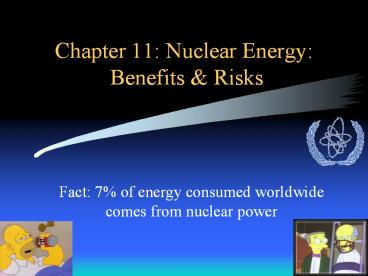Chapter 11: Nuclear Energy: Benefits & Risks PowerPoint PPT Presentation
1 / 17
Title: Chapter 11: Nuclear Energy: Benefits & Risks
1
Chapter 11 Nuclear Energy Benefits Risks
- Fact 7 of energy consumed worldwide comes from
nuclear power
2
(No Transcript)
3
(No Transcript)
4
The Nature of Nuclear Energy
- Two types Fusion and Fission
- Fusion
- Two or more lighter nuclei combine to form
heavier nucleus energy, e.g., hydrogen fusion
to helium - Takes place inside core of Sun
- Takes place in an H-bomb
- Not feasible as a controlled energy source, too
hot to contain
5
The Nature of Nuclear Energy
- Fission
- heavy nucleus splits into smaller particles
energy - Example First atomic bombs, like those dropped
on Hiroshima Nagasaki - Can be controlled and used as a source of
commercial energy Nuclear power plants
6
Figure 11.2
7
Nuclear Reactors Power Generation
- Several types, most use Uranium-235 (some
Pu-239) as fuel - Energy is released, which is used to heat water
to make steam, which is used to turn a turbine to
generate electricity - Figure 11.4 gt
8
Nuclear Fuel Cycle fig 11.9
- U-235 is a nonrenewable resource (just like
fossil fuels), it is mined (expensive) - Typical uranium ore contains only 0.2 Uranium
- Of that 99.3 is U-238 (not usable) and 0.7
U-235 - So, ore must be enriched (expensive) and made
into fuel rods - Fuel rods used in reactors last about 3 years,
but still have radioactivity left spent fuel
rods gt radioactive waste - Disposal of this waste is a major problem
9
Nuclear Waste Disposal
- Fuel rods placed in sealed casks, then
- High-level (of radiation) waste disposal
- Or, burial in geologically stable area
- NIMBY problems
10
Yucca Mountain, NV -- fig. 11.18
- http//www.epa.gov/radiation/yucca/
11
Nuclear Power Concerns
- No fear of nuclear explosion (like a nuclear
bomb) - Greatest fear if proper safety measures arent
followed (human error!), reactor can overheat and
cause a steam explosion, which throws radioactive
material a long distance - Ex Chernobyl disaster of 1986, pp. 234-235
- Ex (almost happened) Three-Mile Island, PA 79
12
Nuclear Power Concerns...
- Exposure to radiation (see table 11.3, p. 237)
- Note Not from nuclear power plants!
- Concern is from handling ore, fuel rods, waste
- Thermal pollution
- water used to cool reactor gets returned to
natural water system (lake, river, ocean) - some species are sensitive to temperature
- fossil fuel plants also release hot water, but
not as much as nucs (1/2 waste heat instead of
2/3)
13
Nuclear Power Concerns...
- Decommissioning costs
- All power plants have a finite life 30-40 years
- Must then be decommissioned, or taken apart in
a systematic and careful way quite expensive to
do right (50 million - 3 billion) - Waste disposal
- already discussed
14
Nuclear Power Benefits (?)
- Produces no air pollution!
- No CO2 (global warming), CO, no nitrogen or
sulfur oxides, no volatile organic compounds, no
particulate matter - Mining is safer than (underground) coal mining
- Very successful in France, where it supplies 73
of its electricity and costs 20 - 30 less than
generating electricity by coal - reason government and public support
15
Nuclear Power Benefits (?)
- A good possible transition fuel as fossil fuels
become more scarce (until better renewable
sources can be developed, recall nuclear energy
is not renewable) - Comment Part of the lack of success of nukes in
the U.S. is the propaganda against it, especially
after Three-Mile Island and Chernobyl (both of
which were caused by human incompetence, not
nuclear technology)
16
Anti-Nuclear Propaganda
17
Read The Nuclear Legacy of the Soviet Union
- P. 231, Notice how we are blamed for this too!

